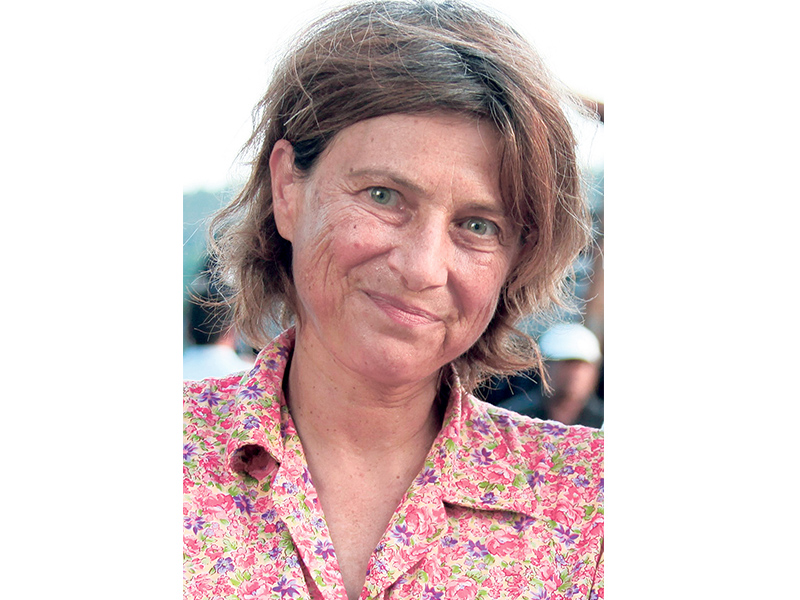When Belgian filmmaker Chantal Akerman was 24, she wrote and directed an ambitious, nearly 3-1/2-hour film. It had an unruly title: Jeanne Dielman, 23, quai du Commerce, 1080 Bruxelles. The drama focused on the long, dull, monotonous days of a bored French housekeeper, played by Delphine Seyrig.
The response to Jeanne Dielman was polarized. The long takes, slow pace and repetitive plotting inflamed audiences. Critics, on the other hand, championed the drama. The Village Voice would later name it one of the 20 best films of the 20th century.
Today, many film schools would be incomplete without showing Jeanne Dielman, or another of the director’s films. Akerman’s work is challenging to watch, often filled with languid plotting and ambiguous characters, but it is always thematically rich. Many of the stories focus on people, both real and fictional, living in exile.
That isolation and loneliness inherent to many of her best films is especially bitter to recall in the wake of Akerman’s death on Oct. 5. She died of a suicide at the age of 65. It was less than a month after her final film, No Home Movie, premiered at the Toronto film festival.
No Home Movie will also screen at this year’s Montreal International Documentary Festival (RIDM). With Akerman’s death still lingering in the minds of film fans, RIDM organizers are paying tribute to the late filmmaker.
Alongside Akerman’s final film, the festival will also have the North American premiere of I Don’t Belong Anywhere, a biographical film of the late Jewish filmmaker.
RIDM organizers had already planned to show these titles before her sudden death, says festival programmer Bruno Dequen.
“We were working on having Chantal come to Montreal,” he says. “We knew maybe mid-summer… that there were troubles in her life. We couldn’t talk about it.”
I Don’t Belong Anywhere, directed by Marianne Lambert, plays in Montreal on Nov. 18 and 19. Akerman’s still-topical 2002 documentary From the Other Side, about Mexican migrants crossing the U.S. border, will screen Nov. 14.
Meanwhile, No Home Movie (screening on Nov. 15 and 20) is one of the filmmaker’s only works to deal with aspects of her Jewish identity. (The title No Home Movie has a double meaning, also referring to how the filmmaker felt like she had no home at all.)
The doc is a portrait of the last months in the life of Akerman’s mother, Nelly, a Polish Jew who was a survivor of Auschwitz and later suffered from chronic anxiety. (Akerman’s father also survived the Holocaust.)
In the documentary, Akerman tries to find out more about her mother’s harrowing experiences, knowing that time is fleeting.
“It’s never in your face in Akerman’s work,” Dequen says of the filmmaker’s Judaism. “[No Home Movie] might be the first time ever that she’s really trying to ask those questions. Her mom is not the most talkative person… but Akerman keeps asking those questions.”
Akerman’s thorny relationship with her mother is a key facet in her early films. The 1977 doc News From Home consists of letters Nelly wrote to her daughter when Akerman moved to New York, recited via voice-over.
“They don’t really talk all that much, but you can feel that she’s always thinking about her mom,” Dequen says of that relationship in No Home Movie, although the statement could also apply to News From Home.
Meanwhile, the passive mother (and title character) of Jeanne Dielman was considered to be a representation of Nelly – a creative decision the director later admitted was ungrateful on her part.
With her unconventional techniques and explorations of lesbian and feminist themes, Akerman’s work has influenced countless artists and filmmakers. Directors like Claire Denis, Gus van Sant and Todd Haynes all wrote eulogies in the wake of her death in October.
Still, Akerman’s films continue to find an audience. Besides the tribute at RIDM and the new documentary, a retrospective of her work recently played at the Institute of Contemporary Arts in London.
That’s not bad for a filmmaker whose works elicited boos from film festival crowds 40 years ago. Regardless, the screenings at RIDM are guaranteed to get rousing applause, in memory of one daring, powerful, singular artist.
